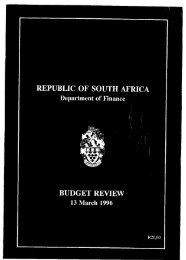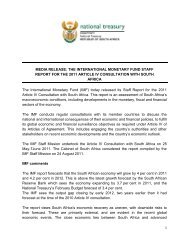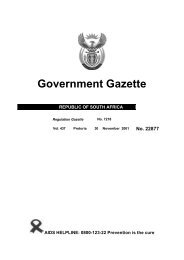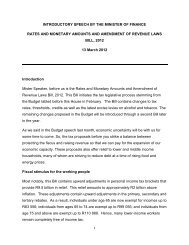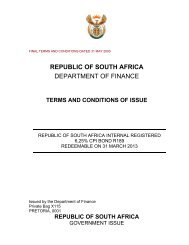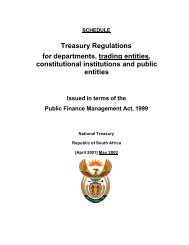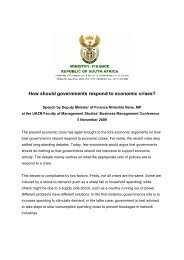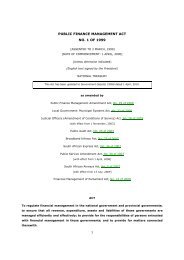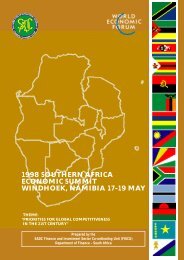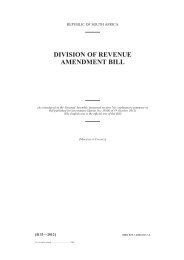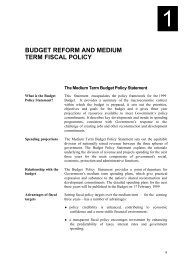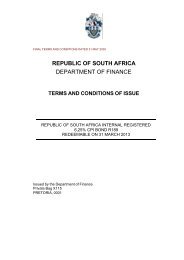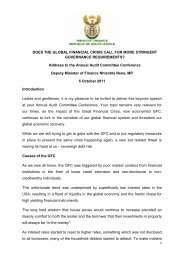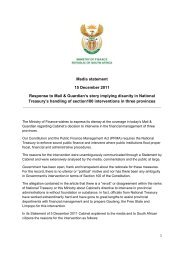Annual Performance Plan Jaarlikse ... - National Treasury
Annual Performance Plan Jaarlikse ... - National Treasury
Annual Performance Plan Jaarlikse ... - National Treasury
Create successful ePaper yourself
Turn your PDF publications into a flip-book with our unique Google optimized e-Paper software.
FOREWORD BY MEC<br />
I believe this APP represents closer alignment to national and provincial strategies and outcomes.<br />
Last year, schools in the Western Cape delivered strong matric results, of which we can all be proud. But, we can and must<br />
do better. We can never be happy with an endorsement rate of only 13.53% of our 17,554 ex-HOR and ex-DET learners,<br />
while in ex-CED schools the endorsement figure for the 6,501 learners of 2006, was 52.13%.<br />
In this respect, I have already announced six clear interventions that we will be making, and these are:<br />
1. Embark on the Quality Improvement, Development, Support and Upliftment Programme (QUIDS UP). This initiative,<br />
led by Minister Pandor, aims to allocate new learning resources to schools, especially in poor and disadvantaged<br />
communities. The programme includes all primary schools in quintiles one and two. These primary schools are feeder<br />
schools to secondary schools that have poor results. It also includes about 80 high schools with poor Senior Certificate<br />
results.<br />
2. Set targets. By the end of March 2007 each high school in the province will have set an overall pass target, a matric<br />
endorsement target and Maths/Science targets for 2007. These targets must be formally signed off by the school governing<br />
body, including the RCL representatives. In fact, as 2007 is the last year of the existing curriculum, all schools will be<br />
encouraged to pull out all the stops to set individual performance records across the board. I also want targets to reduce the<br />
number of dropouts for grades 10, 11, and 12 for 2007 and subsequent years. Finally, literacy and numeracy targets will also<br />
be set during the course of 2007.<br />
3. Broaden our base: work on literacy and numeracy across the board. What is also very clear to me is that we cannot<br />
just look for weaknesses in our high schools. We need to work in our primary schools as well. Our Literacy and Numeracy<br />
Strategy must be strengthened – especially the family literacy programmes and our provincial Language Transformation<br />
<strong>Plan</strong>.<br />
4. Make our schools a safe learning home for all. Some of the issues that have impacted severely on our schools this<br />
year and previous years, are the levels of violence in and around our schools, and the aggressive behaviour of learners. We<br />
will implement an unprecedented inter-sectoral campaign to build a safe learning home for 2007 and beyond. Discipline<br />
patterns and codes of conduct must be set and maintained. Value-adding school improvement plans will be put in place. We<br />
will be assisting all our schools to review and strengthen codes of conduct by October 2007.<br />
5. Monitor and evaluate. I believe the redesign process of the Department must lead to greater research capacity,<br />
monitoring, evaluation and accountability. As a learning organisation, one of our key challenges is to understand our context,<br />
challenges and possibilities and respond to them.<br />
6. Tackle the situation in the 34 schools still performing below 60%. If Iqayiya Secondary School in Khayelitsha could<br />
notch an incredible pass rate of 94% in 2006, up from 39% the previous year, clearly we need to examine this type of<br />
success, and try and replicate it throughout the system.<br />
We cannot continue to tolerate under-performance. We have conducted a full analysis of each under-performing school and<br />
where the main or contributing factors are lack of effective leadership and management, or of problems with fundamentally<br />
weak teachers, we will certainly consider options of redeployment of school principals and senior management teams, in line<br />
with accepted labour practices.<br />
Other key projects for the Western Cape Education Department (WCED) this year, include the implementation of the first<br />
phase of the redesign of the Department; further development of key policies; the development of local education<br />
provisioning plans; the development and introduction of an improved salary dispensation for principals and improving the<br />
administrative support for schools.<br />
Education has been allocated the biggest share of 37% of the total budget for 2007/08, with an emphasis on skills<br />
development, teacher development, remuneration for teachers and administrative personnel, and infrastructure provisioning.<br />
The focus on Early Childhood Development (ECD), Further Education and Training (FET) colleges, and general education<br />
through QUIDS UP, builds quality throughout the system. The additional funds give real hope to parents, teachers and<br />
schools. We will use this injection to build human capital in the province and take further steps to entrench quality education.<br />
Infrastructure remains a challenge but we are exploring a number of options to supplement this allocation. When one<br />
considers allocations to sister departments, which will also assist education generally, for example social development funds<br />
to fight substance abuse, and allocations for promoting school sport, safety and skills development, it means even more<br />
good news.<br />
I look forward to a year in which we can accelerate our efforts to implement strategies, and to deliver more endorsements,<br />
and more learners with maths and science pass rates, and more learners in our FET colleges in pursuit of a better life for all.



